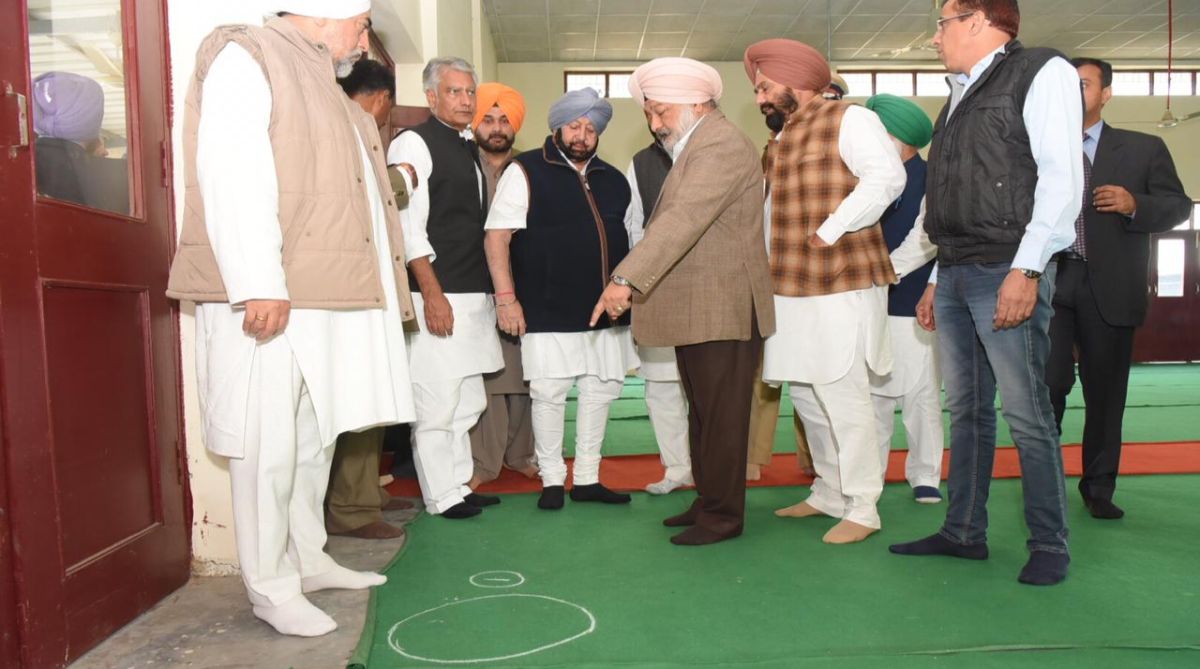Foreign currency notes & expensive cellphones: The lavish Pakistani wedding
In one of the most expensive weddings in Pakistan’s Sialkot, guests were showered with foreign currency notes, expensive cellphones and suits during the reception.
The ISI is trying to revive militancy in Punjab by destabilising the border state and fanning communal unrest.

(Photo: SNS)
From unemployment, drug menace, farming crisis to fund crunch, the Punjab government has been battling on more than one front ever since Amarinder Singh took over as the Chief Minister.
Pakistan’s spy agency, Inter-Services Intelligence’s (ISI) apparent attempt to revive Khalistani terrorism in the border state has added another worry to the state despite Punjab Police’s creditable success so far in foiling such attempts and the resolve of the people of the state not to fall prey to its attempts to create communal strife through acts of violence against a particular community or its leaders.
It was no surprise then that the grenade attack on Nirankari Satsang Bhawan in Amritsar by ISI-backed Khalistani forces in Pakistan that killed three persons failed to get the desired results with the sect’s followers maintaining peace and state police unmasking the plot in less than 72 hours with the arrest of two perpetrators of the attack.
Advertisement
Now it’s clear that the Amritsar attack was apparently a ploy to evoke a violent response from the Nirankaris and create a communal divide. It was differences between Sikhs and Nirankaris that were the origin of the dark days of militancy of 1980-90s in the state. After the Akal Takht, the highest temporal seat of the Sikhs, had issued a hukamnama (edict) against Nirankaris in 1978 over references about Sikh gurus in their literature, violence between the Sant Nirankari Mission and traditional Sikhs on 13 April 1978 in Amritsar had left 13 dead and sparked the subsequent wave of terrorism in the state.
Such attempts have repeatedly been made since 2015 with at least nine targeted killings including the high-profile murder of Namdhari sect matriarch Mata Chand Kaur and RSS leader Brigadier Jagdish Gagneja. A spate of low-intensity bomb explosions, including at a Congress rally at Maur and police station in Jalandhar have also taken place.
The recent grenade attack on a Nirankari congregation in Amritsar is there forepart of the at tempt s being made, mostly from foreign soil, to destabilise Punjab and destroy the state’s peace and harmony, in nexus with criminal gangs. The ISI operatives are working not only from Pakistani soil, but also from other countries, including the UK, Canada and Italy “to fan communal unrest” to succeed in their designs.
Sample this: Since March 2017, Punjab Police has busted 17 terror modules and arrested 81 militants, thereby preventing a large number of terrorist actions in the state.
The state police have seized 77 weapons from these terrorists, including very sophisticated automatic weapons, RDX/other explosives, as well as 12 hand grenades.
Since March 2017, at least three arms consignments, pushed into Punjab by Pak ISI in collaboration with chiefs of different Pakistan-based Sikh militant outfits, such as International Sikh Youth Federation (ISYF), Khalistan Zindabad Force (KZF) and Khalistan Liberation Force (KLF), have been recovered by the Punjab Police. These consignments consisted of AK-47 rifles (5), MP 9 rifle (1), pistols (10) and hand grenades (11).
Indian Army Chief General Bipin Rawat has also warned recently of the potential of revival of insurgency in Punjab while asking the people to remain alert on this front. General Rawat, who was presiding over a function at Nabha (Punjab), said that the possibility of terrorist attacks are everywhere in India, but “Punjab is more vulnerable keeping in view the past history and continuously busting of the terror modules by Punjab Police in the recent past”.
Earlier speaking at a seminar, General Rawat had specially cautioned the security agencies to take preventive steps to check revival of militancy in Punjab, while maintaining that otherwise, “it’ll be too late”.
He even mentioned Mission- 2020 started by the Sikhs for Justice (SFJ), a Khalistan-supporter organisation. The New York based separatist outfit, SFJ has given the call for a worldwide referendum in 2020, on an independent Sikh state or Khalistan.
It’s using its 2020 campaign to radicalise young Sikhs in Punjab as well as within the diaspora. Its campaign invites Sikhs in 20 countries to support the demand for separate nationhood, while claiming that “if the number of positive votes crosses three million, then Punjab would become a separate nation like Pakistan”.
CM Amarinder Singh said attempts by Pak ISI and the Pakistan establishment to forge linkages between Punjabi and Kashmiri terrorist groups is a matter of serious security concern for Punjab.
He said the state police was working closely with central agencies to check the spread of such forces. His government was committed to ensuring that nobody was allowed to disturb the state’s hard-earned peace and harmony, the CM asserted.
Amarinder said ISI is trying to create communal strife in the state by targeting religious sects and leaders, including those belonging to the RSS.
“They are going for large-scale killings,” he said, adding that ISI was the mastermind behind Amritsar attack and targeted killings in the recent past.
“They (Pakistan) want to destabilise the Indian borders by creating disturbance in border states of Punjab, Jammu and Kashmir, Gujarat and Rajasthan,” he said, adding that it was in ISI’s interest to keep the Indian border disturbed to ensure internal peace in Pakistan. While appealing to the people not to panic and maintain peace and law and order, the CM vowed that he would not let the “forces of terror” destroy the state’s “hard-earned peace”.
Advertisement